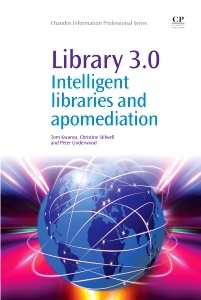Library 3.0 Intelligent Libraries and Apomediation Chandos Information Professional Series
Auteurs : Kwanya Tom, Stilwell Christine, Underwood Peter

- About the authors
- 1: Introduction
- Abstract
- 1.1. Current issues and emerging trends in academic and research librarianship
- 1.2. Drivers of and barriers to change in libraries and librarianship
- 1.3. The modern academic and research library user
- 1.4. The future of academic and research librarianship
- 2: ‘Point oh’ libraries
- Abstract
- 2.1. Advances in web technology: webs 1.0, 2.0, 3.0 and 4.0
- 2.2. ‘Point oh’ libraries
- 2.3. Change in libraries: evolution or revolution?
- 2.4. Reality check: the ‘point oh’ situation in research and academic libraries
- 3: Library 3.0
- Abstract
- 3.1. Library 3.0 principles
- 3.2. Comparing Library 3.0 with the other library service models
- 3.3. The potential of Library 3.0 for research and academic libraries
- 4: Library 3.0 librarianship
- Abstract
- 4.1. Core competencies of ‘Librarian 3.0’
- 4.2. Core competencies of users in Library 3.0
- 4.3. Apomediation in the Library 3.0 context
- 4.4. Research and academic librarians as apomediaries
- 5: Becoming 3.0
- Abstract
- 5.1. Library 3.0 in reality
- 5.2. Library 3.0 tools and resources
- 5.3. Realising Library 3.0: the roles of users, librarians, professional associations and professional education
- Index
Christine Stilwell is a Professor of Information Studies at the University of KwaZulu-Natal. She has been rated by the National Research Foundation as an established researcher since 2008 and serves on several academic journal editorial advisory committees. Christine has also published a co-edited book, a directory of South African resource centres, book chapters, and numerous journal articles.
Peter Underwood is Honorary Professor at the University of KwaZulu-Natal and Emeritus Professor at the University of Cape Town, having occupied the Chair of Librarianship from 1992-2010. He is the author and co-author of several books and journal articles. Peter focuses on information literacy, information systems management, and organizational behaviour in libraries and information services.
- Focuses on social media in research and academic libraries
- Gives context to the discussion of apomediation in librarianship and information services provision
- Provides a balance between more traditional and more progressive approaches
Date de parution : 12-2014
Ouvrage de 190 p.
15x22.8 cm
Thème de Library 3.0 :
Mots-clés :
apomediation; competency index; data mining; disintermediation; infodemiology; information as conversation; information competency; information counselling; infoveillance; intelligent library; knowledge discovery; library; Library 0.0; Library 1.0; Library 2.0; Library 3.0; Library 3.0 principles; Library 4.0; McDonaldisation of libraries; Metaverse; prosumption; quick reference code; research commons; semantic web; swarm intelligence; techno sapiens; technostress; transmedia; web scale; 'Librarian 3.0'


